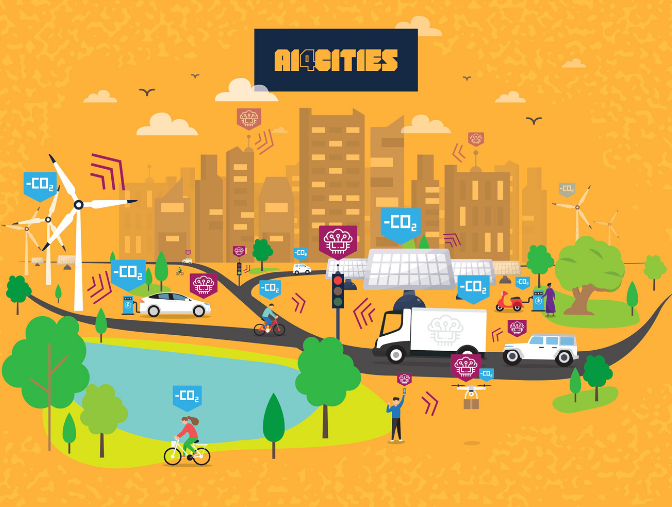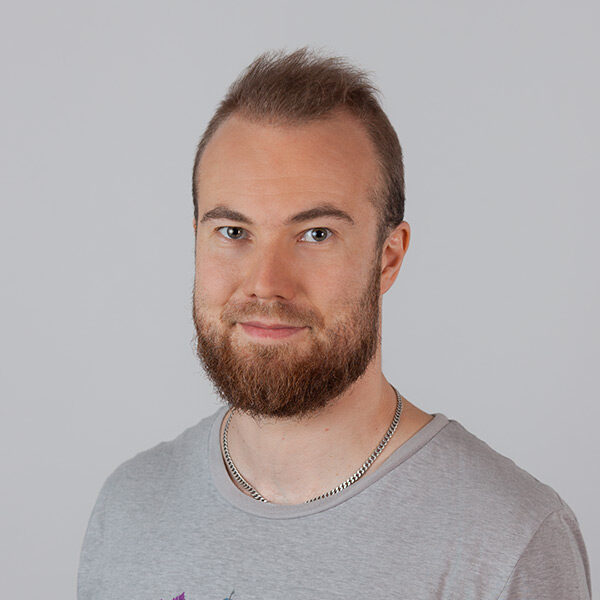The AI4Cities project helped European cities reduce climate emissions with AI-based solutions for transport or energy consumption. The work of the Finnish companies resulted in ways to make transport smoother and reduce buildings’ CO2 emissions.
The project involved 6 EU cities and around 40 companies in total, with the finalists continuing until the end of 2022. AI4Cities aimed to find new innovations to reduce greenhouse gas emissions from the transport and energy sectors. The total budget of the project was EUR 6.6 million, of which EUR 4.6 million went to companies.
Forum Virium Helsinki was the project leader for the AI4Cities project, which ran from January 2020 to December 2022. We asked Arttu Laitinen of MarshallAI and Tapio Toivanen of Eeneman, the Finnish companies involved in the project, how the companies’ work in the project affected their operations.
When were you involved in the Forum Virium Helsinki pilot and what was the project?
Arttu Laitinen: “MarshallAI was involved in the project from 2021 onwards, when companies were selected to develop concepts and then move on to the next phase to build working prototypes. Cities also found the solution interesting for the final phase, where innovations were tested in a real urban environment.”
Tapio Toivanen: “Eeneman was involved in the project from 2021 to 2022, from the selection of companies until the end of the project, and was included in the pilot phase with six other solutions.”
What was piloted and what was your company’s role in it?
Arttu Laitinen: “Together with Dynniq Finland Oy, we implemented a system to optimise traffic lights. MarshallAI had the main responsibility for the project and was responsible for the operation and development of the overall system. The simple aim was to reduce unnecessary stopping and waiting at red lights.
Traffic lights were optimised by connecting a MarshallAI machine vision system as a sensor to the traffic lights. Using artificial intelligence and machine vision, a very accurate real-time picture of the traffic situation was created, allowing traffic lights to be controlled more precisely. In practice, the system effectively detected when there was no longer demand for a green light, allowing the lights to be changed more quickly.”
Tapio Toivanen: “We participated in the energy part of the project with the Building Energy Efficiency consortium. Cities were looking for suppliers with AI-based services to reduce CO2 emissions. The aim was to reduce energy consumption in buildings and cut CO2 emissions by around 15%.”
“Without the project and its funding, this service would not have been developed. In addition to providing funding, the project also helped us find cities willing to carry out the pilot and allow us to control their traffic lights.”
Arttu Laitinen, Head of Smart City, MarchallAI
How did the pilot go?
Arttu Laitinen: “The pilot went well. The system was successfully piloted in Suutarila, Helsinki, and Meudon, a neighbour of Paris. In both cities, machine vision control achieved optimisation benefits by reducing the number of stops and thus traffic emissions. At the same time, very accurate traffic data was collected.”
Tapio Toivanen: “We ran the pilots in Helsinki and Stavanger. In Helsinki, the pilot sites were Kaisaniemi primary school, Stadin AO and Ressu general upper secondary school. In Stavanger, the sites were Emmaus daycare centre, Vardeneset daycare centre and Gautesete school. The pilot started in June 2022 and was due to end on 15 September 2022, but both cities wanted to extend the pilot until the end of the year. The emission reduction target was met in Helsinki, and Stavanger came close to it.”
How did you benefit from your participation?
Arttu Laitinen: “Without the project and its funding, this service would not have been developed. The AI4Cities project was implemented with a PCP (pre-commercial procurement) model, so products already on the market did not fit the bill. In addition to providing funding, the project also helped us find cities willing to carry out the pilot and allow us to control their traffic lights.”
Tapio Toivanen: “Our solution before AI4Cities was based on rule-based optimisation. The project developed an optimisation algorithm based on artificial intelligence / machine learning to achieve a better result. The pilots allowed us to gain more experience of different types of buildings and operating in Norway. Working with an organisation the size of the City of Helsinki was also rewarding.”
“The project developed an optimisation algorithm based on artificial intelligence / machine learning to achieve a better result.”
Tapio Toivanen, CEO, Eeneman
Has the work started in the pilots continued after the end of the project, and how has the development of the solution continued?
Arttu Laitinen: “The development of the system has continued since the end of AI4Cities, although the focus has been on prioritising different transport categories instead of mere optimisation.”
Tapio Toivanen: “Development of the solution has continued and AI v2.0 is in the works. It builds on lessons learned, shortening the implementation time and improving reporting. The members of the Building Energy Efficiency consortium were Eeneman Oy, Unetiq GmbH and Metropolia University of Applied Sciences. Eeneman has acquired the rights to use the algorithm from Unetiq.”
Is any company or city currently using your solution?
Arttu Laitinen: “Our system is currently being used for traffic counting in Lappeenranta, for example. Turku also has an ongoing project on traffic prioritisation at intersections.”
Tapio Toivanen: “Sales of the solution have been boosted in recent months, with a focus on the office and industrial properties of private real estate investors.”
“The pilots also gave the city good experience in the practical aspects of sharing open data and the development of solutions for cities together with businesses.”
Kaisa Sibelius, Project Manager, Forum Virium Helsinki
Read more:
https://ai4cities.eu/
https://forumvirium.fi/en/projects/ai4cities-accelerating-cities-transition-to-carbon-neutrality/

Additional information

Kaisa Sibelius
Project Manager
+358 40 570 1317
kaisa.sibelius@forumvirium.fi

Petteri Rekomaa
Project Manager
+358 50 540 0964
petteri.rekomaa@forumvirium.fi


